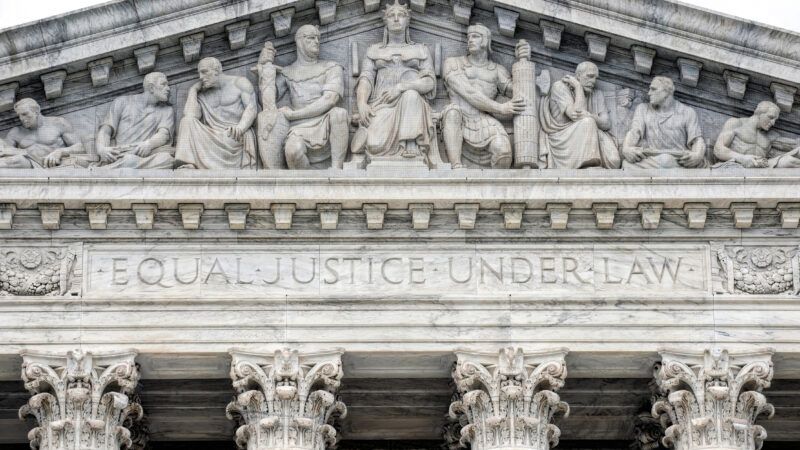Supreme Court Tells Texas to Hold On
Plus: More reactions to the Supreme Court's other decision in the Trump ballot disqualification case, D.C.'s continued minimum wage confusion, California's primary elections, and more...

The other Supreme Court decision. Fresh off a unanimous decision keeping former President Donald Trump on the Colorado state ballot, the U.S. Supreme Court has told Texas to halt the implementation of its controversial immigration law that gives state officials the power to arrest and deport migrants.
The Texas law had been set to take effect this coming Saturday, reports the Associated Press, thanks to a Fifth Circuit Court of Appeals decision that reversed a lower court judge's opinion blocking the law.
The order issued by U.S. Supreme Court Justice Samuel Alito pushes back the start date of the Texas law to March 13 for the moment. The delay is intended to give the Supreme Court more time to consider whether they'll let Texas enforce its own immigration policies.
Texas Gov. Greg Abbott signed S.B. 4, the law in question, back in December 2023. The new law makes it a state misdemeanor to cross the border illegally. Repeat offenders can be charged with more felonies. Per the Texas Tribune, the law also requires judges to order convicted illegal border crossers to leave for Mexico and empowers police to dump them off at the border.
Civil liberties groups have been up in arms about Texas trying to chart its own way on immigration.
"Make no mistake: S.B. 4 bypasses federal immigration authority and threatens the integrity of our nation's constitution and laws," said the American Civil Liberties Union and other civil rights groups in a joint statement urging the Supreme Court to block the law. "We have long warned that this law will separate families, lead to racial profiling across the state, and harm people."
The Supreme Court has put limits on states getting into the business of immigration enforcement in the past. Most notably in 2012, it struck down parts of a 2010 Arizona law that allowed police to arrest suspected illegal immigrants without a warrant and made it a state crime for immigrants to not carry immigration papers with them.
Meanwhile, everyone is processing yesterday's Supreme Court decision that keeps Trump on the ballot in their own way. The big man himself was certainly pleased with the court's unanimous ruling that states can't unilaterally kick candidates for federal office on the ballot because they participated in "insurrection."
"If you're going to win or lose, you have to win or lose at the ballot box, not in a courtroom," said former President Donald Trump, apparently without irony, on Fox News yesterday. "It was a really well-crafted decision. People were very happy about it. Actually, all sides were pretty much respectful of it."
"If you're going to win or lose, you have to win or lose at the ballot box, not in a court room." - President Trump pic.twitter.com/CPoo7z8GBO
— Anthony Hughes (@CallMeAntwan) March 5, 2024
Of course, not everyone was satisfied with the court's ruling. Liberal news commenter Keith Olbermann, measured as always, said the decision signaled the end of democracy and the need to dissolve the Supreme Court entirely.
The Supreme Court has betrayed democracy. Its members including Jackson, Kagan and Sotomayor have proved themselves inept at reading comprehension. And collectively the "court" has shown itself to be corrupt and illegitimate.
It must be dissolved.
— Keith Olbermann⌚️ (@KeithOlbermann) March 4, 2024
Less hysterical liberal commentators are worried about what the decision signals for courts' willingness generally to sanction Trump.
"To anyone hoping that Trump's efforts to overturn the last election would lead the judicial system to meaningfully penalize him before the next one, recent developments have proved sobering," wrote Sarah Ellison and Toluse Olorunnipa over at The Washington Post.
Read Jacob Sullum's analysis for Reason about the relatively unsurprising ruling and some of the finer points the justices argued over.
Scenes from D.C.
Policy makers in the nation's capital are once again making changes to the city's tipped minimum wage policy. Back in 2022, D.C. voters approved a ballot initiative that gradually eliminates businesses' ability to pay a lower hourly minimum wage to workers who earned tips.
This ballot initiative had already been passed once before in 2018, and then repealed by the city council at the behest of city restaurants and bars and many of their workers.
To cope with the ending of the tipped minimum wage, businesses in the city are starting to apply automatic service fees to their checks, causing no shortage of customer confusion and complaints.
Today, the city council will consider a bill that would zero out the tipped minimum wage by 2025 (instead of 2027) while lowering this year's planned base minimum wage increase to 25 cents instead of $2.
.@councilofdc will be considering Tues speeding up elimination of tipped min wage by 2 years (2025 instead of 2027) in exchange for essentially increasing it 25 cents instead of $2 in July.
This is why per @ChmnMendelson
My story. h/t @amanduhgomezhttps://t.co/50NIyFXGCi pic.twitter.com/ncOIm0kGwX— Barred in DC (@BarredinDC) March 5, 2024
QUICK HITS
- California voters go to the polls today. In addition to voting in various primaries, voters in San Francisco will decide on ballot initiatives that would force some people into drug treatment and provide police with more surveillance cameras.
- Speaking of primaries, today's Super Tuesday primaries are a make-or-break moment for Nikki Haley. Judging from her past performance, it'll mostly be break.
- The White House announces a "strike force" to tackle higher, "illegal" prices, reports Politico.
- China's National People's Congress met today and agreed to keep the whole communism thing going.
- The United Nations has released a report finding "convincing" evidence that Hamas raped and tortured Israeli captives.
Rent Free is a weekly newsletter from Christian Britschgi on urbanism and the fight for less regulation, more housing, more property rights, and more freedom in America's cities.


Show Comments (329)